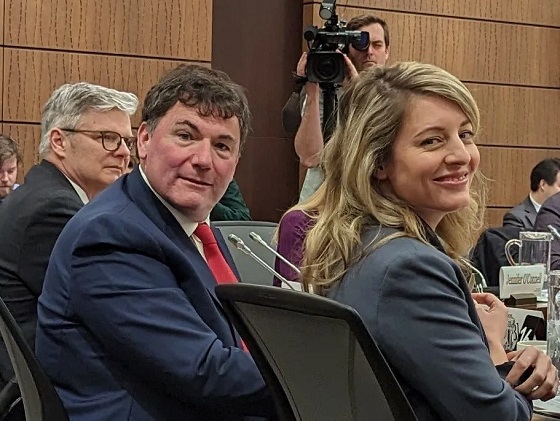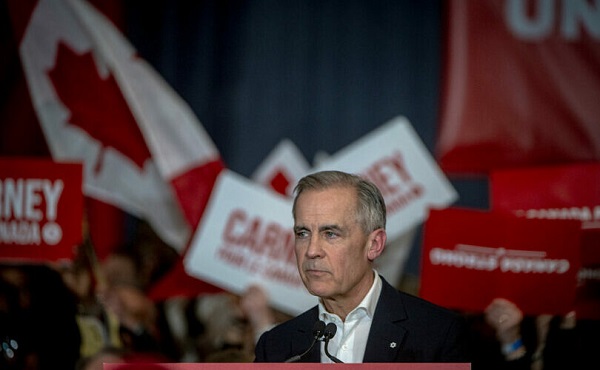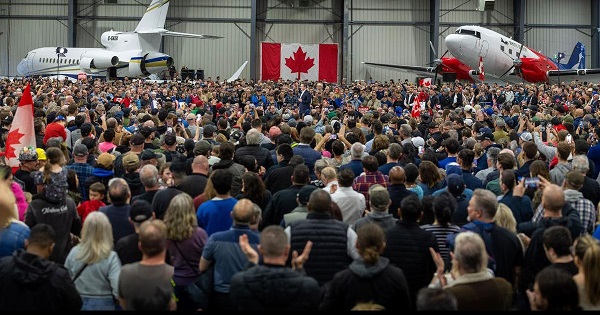National
It’s Been One Week

Imagine the relief they’re feeling. Photo from the voluminous PW files
Paul Wells
Hold it now and watch the hoodwink/ As I make you stop, think
Maybe the Americans assume we’re already part of their country because our leaders won’t get off their TV shows. Politico reports that Justin Trudeau’s office called Jen Psaki on Thursday morning and asked whether she’d interview Canada’s prime minister pro tem for her Sunday MSNBC political show. The PMO’s timing was excellent: Psaki was dropping a kid off at school, so she had excess childcare capacity at precisely the moment she was being offered quality time with somebody high-maintenance.
Trudeau had a message to deliver about Canada-US relations, and he was eager to deliver it to the seventh highest-rated show on MSNBC. He also paid his regards to Jake Tapper, who gets fully one-fifth the viewers of his Fox competitors.
Trudeau’s message to his tiny bespoke audiences was straightforward: that Donald Trump wants to talk about annexing Canada because he doesn’t want to talk about the economic costs of his own tariff policy. Trump’s advisors were said to be working this week on ways to limit those costs. Talk of costs isn’t guaranteed to change Trump’s mind, but nothing is. I don’t have a secret smarter policy I’m keeping in my back pocket; the situation is what it is. Danielle Smith went to Mar-a-Lago — a gambit as legitimate as Trudeau’s visit or anybody else’s — but didn’t come away sounding confident that she’d had better results than anyone else.
Even Stephen Harper — also appearing on a U.S. podcast — sounded worried and perplexed by Trump’s thinking. Still, Canada’s last Conservative prime minister delivered a rebuttal of Trump that was orders of magnitude more on-topic and specific than anything we’ve yet heard from the next Conservative prime minister. There’s playing tough, and then there’s being tough.
Today (Jan 14) is the last day to subscribe to this newsletter at my original rate of $5 a month or $50 a year. Tomorrow the rate goes up to $8 a month/ $80 a year. Anyone who subscribes at the lower rate will remain locked in at that rate for as long as they remain a subscriber.
Trudeau will do what he does until the Liberals select his successor. His itinerary for Tuesday says “No public events scheduled,” yet again. If he has any particular message for Canadians at T2 Minus Six Days, he is in no hurry to deliver it. I think something in him broke after the Toronto—St. Paul’s by-election defeat at the end of June. Sure, he’s talked to Mark Critch and the hot-sauce guy in Quebec. But the fight was out of him long before he made it official. The impulse in almost any politician to tell you exactly what they’re up to — the yearning François-Philippe Champagne has at triple strength — it’s all but vanished from Trudeau for months now. I don’t think it’s because he’s decided to resign. I think if he had managed to stare down his Liberal critics over the holidays, if he still had one more campaign ahead of him, he’d still basically be waiting. In that alternate universe, waiting for the voters to deliver their verdict.
Instead Trudeau let his party’s late-blooming internal opposition win, and now the Liberals are having a bad time of it. I have to assume that in some corner of his psyche, he enjoys seeing them squirm. All he wanted to do was receive the voters’ judgment. There would have been grim realism in letting him. But the Liberal caucus, docile in October, panicked and bolted in December after Chrystia Freeland quit. So now they get to come up with a better idea.
By 2021 or so, the people who’d left the Trudeau government started to look like a better cabinet than the ones who’d stayed. Similarly, a lot of the talent in the emerging Liberal leadership race is in the people who are sitting it out: Dominic LeBlanc, Anita Anand, Champagne, Mélanie Joly if you like. Steve MacKinnon would have been interesting to watch as an underdog. He speaks both official languages better than most MPs speak either, and after an early defeat in 2011, he reacted in the old-fashioned way: by figuring out how to get better at politics. Oh well.
Does anybody doubt the crew who aren’t running for the leadership will have a more pleasant 2025 than Mark Carney, Chrystia Freeland, Christy Clark, Karina Gould, Chandra Arya and That Other Guy? Frenzied parallel campaigns to raise money and recruit supporters. Gigantic questions they’d rather avoid. Party horse-race polls that have exited the realm of arithmetic and turned into Escher drawings. And waiting just over the horizon, cracking their knuckles: the voters of Canada.
Realistically it’ll come down to Freeland and Carney, if they both run. A study in contrasts: she’s from Alberta but couldn’t save her former chief of staff who ran in the riding next to Freeland’s last June. He’s from Alberta but has been flirting with electoral politics since the Obama presidency. “I’ve just started thinking about it,” Carney told Jon Stewart, whose return has driven The Daily Show to fully 40% of Colbert’s ratings. Just started thinking about it? Where’s he been all his life?
I wasn’t kidding, not one tiny bit, when I wrote last week that the least Carney can do is cough up the task force report on the economy that his party’s current leader commissioned from him four months ago. This should not seem like a clever gotcha from one of our nation’s premier snarky pundits. It should be obvious that serious people finish a job, and that the best measure of Carney’s insight and instincts is the work he was theoretically already doing when things got weird.
An obvious question for Freeland is why the Nanos polling spread between Liberals and Conservatives is seven points wider than it was the day before she left the cabinet. Another is whether the “costly political gimmicks” in the Fall Economic Statement she declined to deliver were the first she’d seen.
They’ve both done great things. Carney was appointed to run two central banks by two Conservative prime ministers, neither of whom ever had a word of criticism for his work. He delivered the smoothest possible Brexit even though he hated the idea. Freeland basically picked the Trudeau government up from the wrong side of relations with Russia and dropped it on the right side. Neither needs my permission to march into the history books. But if you think either is a natural political talent, you’ll find the next couple of months hard to watch.
Maybe one of the Liberal candidates will develop the habit of answering questions when asked. It would have the virtue of novelty. It worked well for Harper on that American podcast. Pierre Poilievre is still pivoting to message. Last week he was asked why Elon Musk seems to like him. “If I ever get a chance to meet Musk, I would say, how do we make this an economy where we bring home hundreds of billions of dollars of investment to Canada?” Smooth. Except Musk makes no secret of his answer: ban union labour. Which fits poorly with some of Poilievre’s pro-union marketing.
Two years ago three of Poilievre’s MPs met with Christine Anderson, a German eurodeputy from the AfD party. Poilievre called her views “vile” and said they “have no place in Canada.” Musk has been campaigning nearly full-time for Anderson’s party in German legislative elections.
I’m not trying to pin AfD’s politics on Poilievre. I’m just pointing out that once he no longer has Trudeau to kick around, the internal contradictions in Poilievre’s positions will become harder to ignore.
This week Jenni Byrne, Poilievre’s lead gatekeeper, came in for criticism when she criticized Erin O’Toole for saying nice things about Anita Anand. “For anyone unsure why Erin is no longer leader of the Conservative Party…. [Anand] supported DEI [diversity, equity and inclusion] policies like name, rank and pronouns. Tampons in men’s rooms, etc.” Much of the criticism amounts to dismay that Byrne could be so mean. I could hardly care less. But I do wonder where Byrne expects Canadian soldiers to fight, and alongside whom. Here’s a story on pronoun use in the U.S. Navy and Marines. Here’s one on the UK’s Ministry of Defence offering pronoun guidance while Boris Johnson was prime minister. Here’s NATO’s gender-inclusive language manual. When congratulating oneself on preferring a warrior culture to woke culture, it’s handy to have the first clue what’s going on in other warrior cultures.
Mostly I wonder how anyone could look at a Navy [UPDATE: That should read “Air Force” — pw] veteran congratulating a former Minister of Defence and think, before anything else, “But the tampons!” Poland, and Elon Musk’s friend Donald Trump, want member states in the woke NATO alliance to spend five percent of GDP on national defence. All of the Liberals and all of the Conservatives in all of Canada’s little schoolyard arguments have never come up with a plan to get to two. I know we all get excited about our little feuds, but after an election comes, whoever wins will have to provide real government for a real country in a real world. That’s harder than tweeting.
2025 Federal Election
Mark Carney pledges another $150 million for CBC ahead of federal election

From LifeSiteNews
Prime Minister Mark Carney has promised $150 million in additional funding to the Canadian Broadcasting Corporation (CBC) on top of its current $1.4 billion annual government handout.
During an April 4 press conference in Montreal, newly elected and campaigning Prime Minister Mark Carney pledged an additional $150 million in funding to the CBC ahead of the April 28 federal election.
“We will give it the resources it needs to fulfill its renewed mission and ensure that its future is guided by all Canadians and not subject to the whims of a small group of people led by ideology,” Carney said.
“Our plan will safeguard a reliable Canadian public square in a sea of misinformation and disinformation, so we can stay informed and tell our own stories in our own languages,” he continued.
The 150 million taxpayer dollars are in addition to the outlet’s $1.4 billion annual government subsidy.
Following Carney’s announcement, CBC spokesman Eric Wright promised that “during the election period we do not have any comment on the parties’ positions on CBC.”
Notably, the proposed funding increase is being announced just weeks before Canadians head to the polls to elect a new prime minister, leading some to speculate that it is an attempt to encourage the CBC to report favorably on the Liberal Party, especially considering Conservative Party leader Pierre Poilievre has long been campaigning to defund the CBC, often accusing it of having a left-wing bias.
Indeed, there have been multiple instances of the CBC pushing what appears to be ideological content, including the creation of pro-LGBT material for kids, tacitly endorsing the gender mutilation of children, promoting euthanasia, and even seeming to justify the burning of mostly Catholic churches throughout the country.
Accusations that government-funding of the CBC leads to it having a bias were further inflamed last September when then-Liberal House leader Karina Gould directed mainstream media reporters to “scrutinize” Poilievre.
Gould’s comments were in reference to Poilievre’s promise to defund the CBC if elected prime minister.
2025 Federal Election
I don’t believe these polls!

 Dan McTeague
Dan McTeague
Cards on the table, I’m skeptical of the current state of the polling in this election. My sense is that Mark Carney and the Liberals’ numbers are, at least in part, a byproduct of sympathetic pollsters over-sampling their key demographics, and those being trumpeted to high heaven by the publicly-funded media. That, coupled with voters’ justifiable annoyance at Donald Trump’s “51st State” cracks and tariff threats, has contributed to an illusion of enthusiasm, a sense that they are running away with this thing.
That said, one polling data point has struck me as being both real and important. A recent Abacus Data poll showed that, when you cut out all the distractions, Canadians’ biggest concern remains our inflated cost of living. And that is an issue which clearly favors Poilievre and the Conservatives.
That’s because the dire state of our economy can largely be laid at the feet of the Liberals, who’ve been running the show for the past decade. Yes, they’ve made a change at the top, but not much of one. On top of being a globe-trotting member of the “Green” Elite, and champion of environmentalist banking, Mark Carney was a Liberal advisor for years, a key part of the Trudeau “brain trust” — trust me, I use that term loosely — that cooked up a whole raft of economy smothering “Green” policies which have done nothing to reduce global carbon emissions, but have succeeded in lightening our wallets.
Under Trudeau, our annual GDP growth noticeably shifted from the 3% range towards the end of the Harper years to the 1% range more recently. Household debt-to-income ratios rose steadily in the same period, while real household spending per capita dropped 2-3% below 2019 levels by 2024, as costs and interest rates went up. Disposable income growth has been outpaced by inflation and taxes, and bankruptcy filings have risen 40% since just 2019.
Canadian food prices have exploded by 35-40%, with family spending up over 50% over the past decade. Consequently, food insecurity rose to 23% by 2023, from around 8% in 2015, and Food Banks Canada has reported a 78% surge in usage from 2019 to 2023.
Meanwhile, Canada’s national debt, which was just over $600 billion when Justin Trudeau was handed the federal credit card, has roughly doubled, reaching over $1.2 trillion by the time he left. And provincial debt has risen by about $1 trillion in the same period.
It’s a frightening financial snapshot. And many of these negatives can be attributed to the Liberals’ war on oil and gas, which remains — however much Carney might wish otherwise — the backbone of our national economy.
So much of the Liberals’ time and effort in government has been spent kneecapping the resource sector, and for purely ideological reasons. From Bill C-48, the Oil Tanker Moratorium Act of 2019, which significantly reduces our ability to sell oil and gas abroad, to Bill C-69, which added mountains of red tape for infrastructure projects, so much so that it was nicknamed the “No More Pipelines” Act.
You’ll remember that the Supreme Court ruled the “No More Pipelines” act largely unconstitutional two years ago. Even so, Carney recently said he has no intention of repealing it, prompting Poilievre to tweet out, “This Liberal law blocked BILLIONS of dollars of investment in oil & gas projects, pipelines, LNG plants, mines, and so much more,” with an excellent infographic attached, listing the various cancelled energy projects throughout Canada since the Liberals came to power.
And then of course, there’s the Consumer Carbon Tax, which started out at $20 per tonne of CO2 emitted in 2019, small enough that many Canadians barely noticed they were paying it, but increased every year until it hit $80 per tonne.
By that point it became so noticeable and unpopular that the Liberals felt they had no choice but to “cancel” it (“zero it out” is more accurate), before it could reach the $170 by 2030 which they’d planned. Still, it remains on the books, ready to be raised again, without a vote, if Carney so chooses.
Even if he doesn’t, Carney has doubled down on the Industrial Carbon Tax. While the Liberals claim this is an improvement because it isn’t paid by working Canadians, only by big evil “polluters.” Of course, they said something similar about the Consumer Tax, that by some financial wizardry, we regular folks would get back more than we paid in, which turned out to be total bunk.
Meanwhile, the Industrial Tax makes our lives more expensive in essentially the same way as the Consumer Tax. It raises the cost of doing business, of heating our homes, of filling up our car, of our grocery bills. It just does so by a less direct route, by taxing businesses instead of individuals, so that we pay when the price of goods and services goes up in response.
The Industrial Carbon Tax, much like Trudeau’s Clean Fuel Regulations, is ultimately a hidden tax, and that suits Carney just fine. He’d prefer that we not know who to blame as our cost of living skyrockets.
The Liberal Party’s economic record over since 2015 has been atrocious, and it will be no different under Mark Carney. He is complicit, and he continues to support policies which would make us poorer, like Bill S-243, the “Climate-Aligned Finance Act,” which Carney testified before the Senate in support of last year. That bill sought to make it nearly impossible for banks to invest in, or loan money to, oil and gas projects in Canada, and tried to force financial institutions to appoint board members ideologically opposed to fossil fuels.
Canada needs to change course, and soon. As things stand, it will be tough for even a good captain to navigate us through the rough seas the Liberals have steered us into over the past ten years. A few more, and with Mark Carney at the helm, might make that impossible.
Dan McTeague is President of Canadians for Affordable Energy.
Support Dan’s Work to Keep Canadian Energy Affordable!
Canadians for Affordable Energy is run by Dan McTeague, former MP and founder of Gas Wizard. We stand up and fight for more affordable energy.
-

 Business2 days ago
Business2 days agoTrump threatens additional 50% tariffs on China, urges ‘patience’
-

 2025 Federal Election15 hours ago
2025 Federal Election15 hours agoWATCH: Massive Crowd for Historic Edmonton Poilievre Rally
-

 Alberta2 days ago
Alberta2 days agoProvince introducing “Patient-Focused Funding Model” to fund acute care in Alberta
-

 International1 day ago
International1 day agoUN committee urges Canada to repeal euthanasia for non-terminally ill patients
-

 MacDonald Laurier Institute1 day ago
MacDonald Laurier Institute1 day agoRushing to death in Canada’s MAiD regime
-

 2025 Federal Election16 hours ago
2025 Federal Election16 hours agoAn In-Depth Campaign Trail “Interview” With Pierre Poilievre
-

 2025 Federal Election2 days ago
2025 Federal Election2 days agoMark Carney Comes to B.C. and Delivers a Masterclass in Liberal Arrogance
-

 2025 Federal Election15 hours ago
2025 Federal Election15 hours agoHarper Endorses Poilievre at Historic Edmonton Rally: “This Crisis Was Made in Canada”






